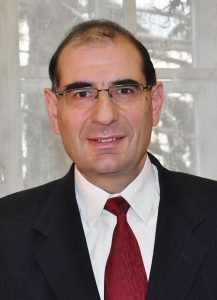“In Hungary even nowadays people are ashamed of this disease (stroke), they do not talk about it, they live their life withdrawn, stopping all social activities, and therefore the beneficial rehabilitation opportunities often cannot be brought to their attention. In many cases, the society and the relatives give up on the stroke survivors” says András Folyovich, MD PhD – Board member of the National Stroke Prevention and Rehabilitation League – Hungary.
SAFE: What is one issue related to the life after stroke in your country that you think needs special attention?

András Folyovich, MD PhD – Board member of the National Stroke Prevention and Rehabilitation League
AF: Among the serious consequences of stroke, social reintegration is one of the most important issues, which needs special attention. Stroke survivors recovering with residual symptoms experience that their roles in the society are significantly affected: they can no longer fulfill their former work, and everyday tasks. They may even be forced to resign and thus the economic situation of the families becomes insecure. Significant number of stroke-patients need constant care, and the families face big financial burden. Moreover, family members often must quit their jobs too due to patient care. This emotional and financial burden is very difficult to live with for the affected families.
SAFE: What would be the solution, i.e. what is your organisation’s position regarding this issue?
AF: In our opinion, civil organisations can help a lot in the successful reintegration into the community.
The majority of stroke survivors are discharged into the community. However, after the hospital discharge stroke-survivors and their caregivers are not fully aware of the available further rehabilitation options (physiotherapy, speech and language therapy, stroke support organisations etc.). The situation is worse for those, who are living in the countryside, as there are limited rehabilitation opportunities.
Stroke support organisations can help to give the useful information about the existing support groups, rehabilitation facilities and various equipment. Providing orthotics and transfer- and mobility equipment may assist for patients to be able to leave their homes and to start to fulfill the roles, they used to do before.
Support groups can also be helpful to give a platform, where stroke-survivors can meet and share their experiences and support each other.
In summary, our vision is a world, in which the number of stroke cases decreases significantly and all stroke patients receive a personalized, short and long-term support and care, with successful social reintegration.
SAFE: Please tell us more about your organisation.
AF: Our non-profit civil organisation was founded in 1993 and named ’The National Stroke Prevention and Rehabilitation League’ in 2011. Our mission is the prevention and the rehabilitation of stroke patients through services, personal assistance, information, advocacy and cooperation with health professionals.
Our core activities include:
- organising free health screening events (Stroke screening day at Szent János Hospital)
- editing and issuing healthcare brochures and their distribution (e.g.: physiotherapy exercise booklets to those who live in the countryside)
- providing access to transfer and mobility equipment
- personal assistance and advocacy to stroke-patients and their relatives
- participation in national and local health related events
- recruiting new members
The League’s services and programmes are available for everyone. In order to make our work more effective we also co-operate with other national and foreign organisations and governmental decision-makers (e.g.: Aphasia Club, International, Pető Institute, SZÍV SN Association for heart diseases etc.)
The National Stroke Prevention and Rehabilitation League is currently unable to fulfil their tasks appropriately, due to the lack of funding. The League cannot count on direct financial support either from the government, or from pharmaceutical- and other medical companies.
The reason for this is that traditionally the Hungarian Stroke Association (the medical-professional company) organises the stroke-days and the public awareness events, which means that the financial support arrives there.
The solution may be the revaluation of the National Stroke Prevention and Rehabilitation League and the Hungarian Stroke Association. For which, there is a good chance with the current leadership. In close co-operation, it is necessary to redistribute the tasks. The League should deal with the public issues, while the medical-professional company should be responsible for the professional background. It would be beneficial to contact with the neurological departments of Hungary, and to organise the civil organisations around these departments.





